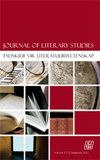选择南非荷兰语叙事作品中的生态批评问题:批判视角
IF 0.1
4区 文学
0 LITERARY THEORY & CRITICISM
引用次数: 1
摘要
以环境为导向的文学和文化研究,或简称生态批评,在20世纪80年代末在美国获得了关注。早在本世纪初,它就在南非生根发芽,直到最近十年才被应用到南非荷兰语文学领域。在2010年奈梅亨的一次会议上,德国生态评论家阿克塞尔·古德博迪(Axel Goodbody)对生态批评在非英语文学中的缓慢传播表示担忧。他强调了英语作为传播媒介的霸权对生态批评实践的削弱作用。古德博迪警告说,如果忽视在非英语语言和其他语境中进行理论化和批判性分析的资源,生态批评辩论将会更加贫乏;以及不受英语传统支配的文化。南非荷兰语是这一领域不同民族声音和语言激增的一部分。本文进入了关于生态批评研究扩展的辩论,以包括一个更以环境为导向的研究世界,而不是几十年来由英语文献主导的研究世界。它对以南非荷兰语文学叙事为中心的生态批评研究如何增加细微差别并扩大我国生态批评感兴趣的主题问题提供了批判性描述性概述。我想强调南非荷兰语文学评论家对“理解人类与地球的关系”(Joni Adamson & Scott Slovic, 2009: 6)做出的各种令人信服的贡献。对这些贡献进行分析,也是为了评估在生态批评的更广泛理论话语中使用的各种理论角度的相关性。本文章由计算机程序翻译,如有差异,请以英文原文为准。
Ecocritical Concerns in Select Afrikaans Narrative Works: Critical Perspectives
Summary Environmentally oriented literary and cultural studies, or ecocriticism for short, gained traction in the United States of America in the late 1980s. It took root in South Africa no earlier than the start of this century and has been applied to the field of Afrikaans literature only for about the last decade. At a conference in Nijmegen in 2010, the leading German ecocritic Axel Goodbody expressed concern about the slow spread of ecocriticism to non-Anglophone literatures. He highlighted the debilitating effect of the hegemony of English as medium of communication on practising ecocriticism. Goodbody warned that ecocritic debates would be poorer if they neglect the resources of theorising and critical analyses in non-English-speaking language and other contexts; and cultures that are not dominated by Anglophone traditions. Afrikaans has been part of the surge of different national voices and languages in this field. This article enters the debate about the expansion of ecocritical studies to include a more environmentally oriented world of research than the one dominated by Anglophone literatures for quite a few decades. It offers a critical-descriptive overview of how ecocritical studies centred on Afrikaans literary narratives add nuances to and amplify thematic matters of interest for ecocriticism in our country. I want to highlight the diverse and convincing contributions made by Afrikaans literary critics to “the understanding of the human relationship to the planet” (Joni Adamson & Scott Slovic, 2009: 6). These contributions are analysed in order to also evaluate the relevance of the various theoretical angles of approach in use, regarded within the broader theoretical discourse of ecocriticism.
求助全文
通过发布文献求助,成功后即可免费获取论文全文。
去求助
来源期刊

Journal of Literary Studies
Multiple-
CiteScore
0.50
自引率
0.00%
发文量
0
期刊介绍:
The Journal of Literary Studies publishes and globally disseminates original and cutting-edge research informed by Literary and Cultural Theory. The Journal is an independent quarterly publication owned and published by the South African Literary Society in partnership with Unisa Press and Taylor & Francis. It is housed and produced in the division Theory of Literature at the University of South Africa and is accredited and subsidised by the South African Department of Higher Education and Training. The aim of the journal is to publish articles and full-length review essays informed by Literary Theory in the General Literary Theory subject area and mostly covering Formalism, New Criticism, Semiotics, Structuralism, Marxism, Poststructuralism, Psychoanalysis, Gender studies, New Historicism, Ecocriticism, Animal Studies, Reception Theory, Comparative Literature, Narrative Theory, Drama Theory, Poetry Theory, and Biography and Autobiography.
 求助内容:
求助内容: 应助结果提醒方式:
应助结果提醒方式:


